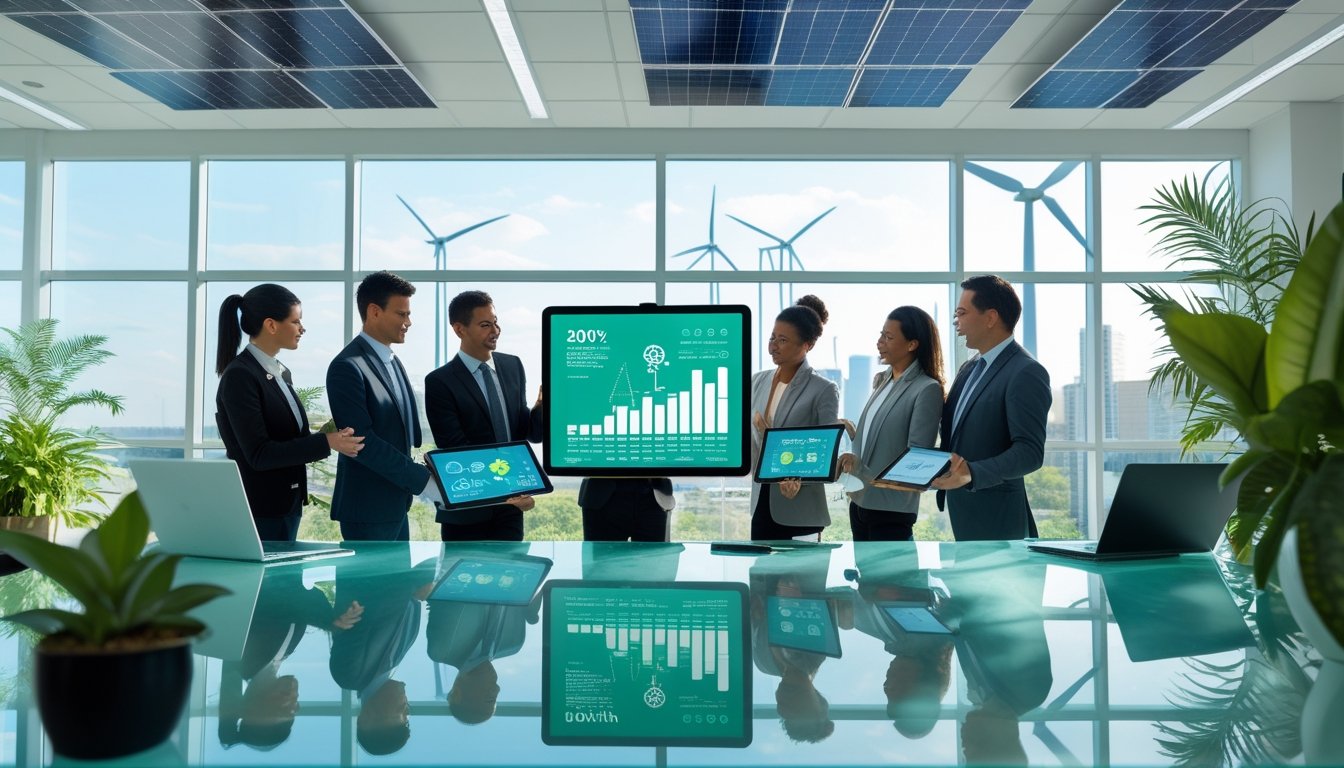Late updated: 14 Jul 2025 14:07
Written by: Amber Collins
Top Green Technologies For Business Growth: Driving Sustainable Innovation
The advancement of green technology is reshaping the landscape of modern business, driving not only environmental sustainability but also economic growth. Businesses that embrace green technologies often find that they enhance efficiency, reduce waste, and boost competitiveness. These technologies hold the key to addressing the urgent demands of climate change while opening doors to innovative business models and opportunities.

Our exploration covers a range of cutting-edge solutions, from renewable energy sources to innovative recycling methods, offering companies a chance to align with global sustainability goals. By integrating these technologies, businesses can achieve higher performance levels while contributing positively to the planet.
Understanding and implementing the right green technologies can equip businesses with the tools needed to thrive in an increasingly eco-conscious market. The opportunities for growth and innovation are immense, and we are eager to guide you through this exciting transition.
Key Takeaways
- Green technologies foster economic and environmental benefits for businesses.
- Implementing sustainable practices boosts competitiveness and efficiency.
- Understanding emerging applications is key to business transformation.
Key Green Technologies Driving Business Growth
Businesses today harness a powerful set of green technologies to meet sustainability goals and enhance profitability. Renewable energy, energy-efficient systems, advances in storage solutions, and innovations in supply chains are playing pivotal roles in decreasing carbon emissions.
Renewable Energy Solutions
Our journey begins with renewable energy solutions, such as wind, solar, and green hydrogen. These clean energy sources dramatically lower carbon footprints while providing sustainable and reliable power. Companies increasingly invest in solar panels and wind turbines, reflecting a significant drop in renewable energy costs over recent years. Green hydrogen is gaining traction, with its potential to revolutionise energy sectors by serving as a clean fuel alternative for various industries, helping us achieve ESG targets and support a sustainable future.
Energy-Efficient Systems and Smart Grids
Energy efficiency and smart grids offer transformative potential for modern businesses. By employing technology innovation such as smart meters, companies can monitor and optimise energy consumption, thus boosting efficiency. Smart grids enhance energy distribution, ensuring reliability and reducing wastage. When combined with intelligent building systems, businesses realise substantial savings and lower carbon emissions. This not only advances corporate sustainability initiatives but also promotes a more sustainable market landscape.
Innovations in Energy Storage
Energy storage is a crucial element in the effective use of renewable sources and eliminating intermittency issues that accompany them. Advances in battery technology, including the use of lithium-ion and solid-state batteries, allow for efficient energy storage solutions. Incorporating these innovations enables us to store surplus energy generated by renewables for later use. This development increases grid reliability and supports the integration of renewables, thereby enabling businesses to contribute towards carbon capture and reduction strategies.
Sustainable Supply Chain and Circular Economy Integration
Integrating sustainable supply chains and circular economy principles is key for businesses aiming to reduce environmental impact. Emphasising the reuse, recycling, and remanufacturing of materials, these strategies decrease waste and promote resource efficiency. Sustainable supply chains lower carbon emissions and embrace cleantech by optimising logistics and sourcing responsibly. Companies adopting circular models not only enhance their environmental credentials but also drive growth by aligning with consumer demands for environmentally conscious products and services.
Emerging Applications and Strategies for Sustainable Business

Our exploration of green technologies unveils promising strategies and applications driving sustainable business practices. Key technologies include the Internet of Things (IoT) for optimising environmental management, innovative approaches to waste reduction, biotechnology enhancing agriculture sustainability, and advanced water management systems.
IoT and Digital Technologies for Environmental Management
IoT sensors and EMS play pivotal roles in revolutionising environmental management. By deploying IoT devices, businesses monitor real-time data on air quality, energy consumption, and waste levels. This technology enhances efficiency by offering precise analytics to guide decision-making. For instance, IoT-enabled smart grids balance electricity supply and demand, reducing emissions. Additionally, digital platforms streamline operations by integrating data sources, enabling proactive and informed strategies.
Advancements in Waste Management and Waste Reduction
Innovations in waste reduction and management have greatly influenced sustainable business practices. Techniques like waste-to-energy transformation and automated sorting help in minimising environmental impact. Implementing IoT in waste handling infrastructure allows for efficient tracking and optimisation. Businesses embracing circular economy models reduce waste by recycling and reusing materials. Additionally, advanced recycling technologies have emerged, enhancing the effective utilisation of resources and reducing landfill contributions.
Biotechnology and Sustainable Agriculture Innovations
Biotechnology drives advancements in sustainable agriculture, significantly influencing food production. Genetically modified crops increase yields and resist pests, reducing chemical usage. Precision farming utilises GPS technology and sensors to optimise inputs like water and fertilisers. Moreover, biopesticides and biofertilisers offer environmentally friendly alternatives to chemical-based solutions. These innovations not only improve crop resilience to climate change but also ensure food security.
Water Management for Resource Optimisation
Effective water management is crucial for sustainable business operations. Implementing smart irrigation systems, powered by IoT sensors, ensures optimal water use in agriculture and landscaping. Businesses adopt rainwater harvesting and greywater recycling to minimise reliance on freshwater sources. These practices not only conserve water but also reduce costs. By investing in cutting-edge technologies and infrastructure, we ensure sustainable water resource management.
These innovations and strategies present a comprehensive view of how businesses can leverage technology to foster sustainability. From IoT to biotechnology, the integration of these applications promises a more sustainable future.
Frequently Asked Questions

As businesses increasingly turn towards green technologies, understanding the specific innovations, integrations, and benefits becomes essential. Questions about these aspects are central to enhancing sustainable business practices.
What are the leading green technology innovations driving business growth?
Key innovations include energy-efficient systems, green hydrogen, and sustainable biotech. These technologies offer new avenues for growth by promoting environmental responsibility and operational efficiency.
How can businesses integrate sustainable practices through green technology?
Businesses can adopt energy-saving measures, utilise renewable resources, and implement waste minimisation strategies. Incorporating these sustainable practices often involves re-evaluating existing operations and investing in green solutions.
What are the benefits for businesses investing in green technologies?
Investing in green tech not only supports environmental goals but can also lead to improved operational performance and cost savings. Companies often see enhanced brand reputation and competitive advantage as direct benefits.
Which sectors are experiencing the most significant impact from green tech advancements?
Sectors such as energy, manufacturing, and transportation are experiencing profound changes. Renewable energy solutions and efficiency improvements are transforming these industries by reducing environmental impact.
How are green tech startups shaping the future of sustainable business practices?
Green tech startups are pioneering renewable energy solutions and software, driving innovation across industries. They help traditional companies transition into sustainable practices, fostering a culture of ecological responsibility.
What strategies do businesses use to assess and implement green technology solutions effectively?
Companies often conduct thorough assessments and feasibility studies to identify optimal green technologies. Pilot projects, expert consultations, and gradual integrations are common strategies for successful implementation.
